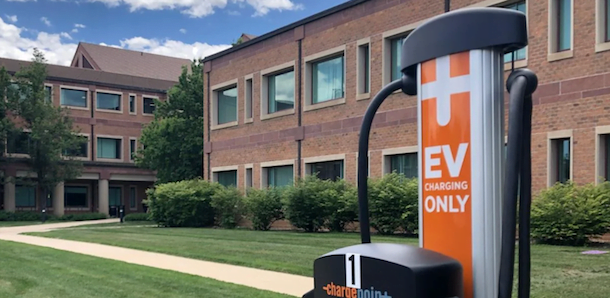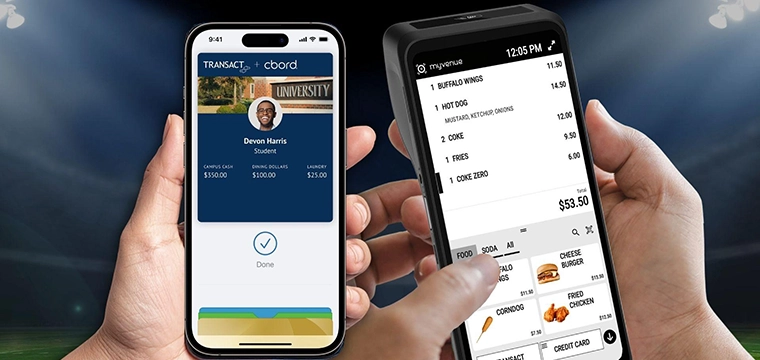
Electric vehicles are the future and campuses will need to support charging infrastructure
The EV revolution is coming to universities – and with it, the need for EV charging on campus. This emerging service could be opening new roles for campus ID card.
College and university officials should begin preparing now for how they will handle the increasing use of electric cars, scooters and bikes by students and even faculty and staff. Decisions made now about how to access and manage EV charging will bring big impacts in the coming years.
That is among the main messages from a recent CampusIDNews interview with two HID Global executives charged with helping ease the transition to electric vehicles and the charging infrastructure requires to support them.
“We have seen more EV usage in the workplace environment, and the education market is also emerging,” says Mohit Khoda, Senior Manager of Product Marketing, Extended Access Technologies at HID Global. “It is still very new so we don’t know how the whole thing will play up. Right now, everyone is testing the waters.”
The EV trend is increasingly well funded and has gained a momentum that seems all but certain to continue. The Federal Infrastructure Investment and Jobs Act and other programs are pumping fresh funding to states for their own EV projects.
Each day seems to bring news of new capital and focus for EV projects, whether $25 million for EV development South Carolina, New York’s proposed ban on gas-fueled automobiles or a Detroit pilot that involves in-road EV charging.
Campuses will not be isolated from these trends – indeed, some colleges and universities already offer EV charging on campus at low or no cost for faculty members. EV charging poses unique on campuses, in part because parking is often limited and charging stations chew up valuable real estate.
HID’s role is to help campuses or their partners operate EV charging systems – and craft ID and access process to ensure only approved users access the system and that, when required, payments are collected.
“It is quite similar to gaining access to smart lockers, or enabling students, teachers and other members of the campus community to buy food and other retail goods via their ID cards and digital credentials,” says Khoda.
As explained by Helmut Dansachmüller, Vice President of Product Marketing and Innovation, Extended Access Technologies at HID Global, campuses face a variety of business models when it comes to accessing EV charging stations.
For instance, universities could operate the service for students and faculty or could work through local utilities to set up a charging infrastructure. Campuses could offer free charging – as some already do – or charge for the use of the stations.
Khoda adds that some or all charging stations “could be public, like a gas station, open to all.”
That may turn out to a popular choice with larger universities.
“Indeed, that is how it’s done at the HID office in Austin, where a couple of charging stations are open to the public while the others are restricted to employees,” says Khoda. “A technology-focused university such as MIT might do it differently than a state school in the Midwest, and small institutions will almost certainly look different than large metropolitan sites.”
In pretty much all cases, however, a campus-based EV charging station infrastructure requires a robust credentialing and ID system.
The general idea, as the HID executives explain, is to place an RFID contactless reader module into the charging device, integrating the solution into the EV power station.
“It has to be integrated so it is protected from the elements,” Dansachmüller says. “The main protection is for wide-ranging temperature fluctuations, though snow also can tax the system and draw more battery power, something HID is prepared for when dealing with campus EV charging stations.”
Similar to the way smart lockers are accessed on campus, the RFID contactless reader provides a secure way to access the charging station without the need for PIN codes or text messages. As well, he adds, the process also enables integrators to use APIs, furthering the potential use of more technology.
“As projects progress, it’s also very likely that EV charging station access will come via smart phones along with cards,” Khoda says.
It’s important to note that the ongoing EV revolution is somewhat complex because of the array of players involved. While HID aims to provide credentials and RFID reader modules to the infrastructure, the stations are owned by a third-party, power is coming from a utility, and another business or campus unit is likely to be in charge of parking-lot management.
But that’s just another reason to get this part of the EV campus infrastructure totally right. If one part fails, the whole system can break down, and then faculty, students and staff members might lose confidence in EV as other campuses do better.
Both Khoda and Dansachmüller agree that campuses must prepare. “The government is supporting this with a lot of incentives,” says Khoda. “And EV is going to be a part of the Gen Z generation.”
For more info on EV charging and how HID Global can provide solutions for your campus, visit HIDGlobal.com.




